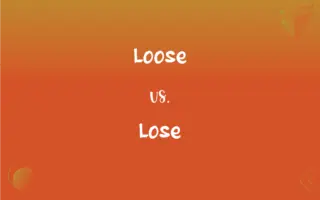Got vs. Gotten: What's the Difference?
Edited by Aimie Carlson || By Harlon Moss || Updated on October 19, 2023
"Got" is the past tense of "get," while "gotten" is the past participle used in American English.

Key Differences
Got is the simple past tense form of the verb "get." It indicates a completed action that happened in the past. Gotten, conversely, is the past participle form of "get" used primarily in American English to indicate something obtained or received.
In British English, "got" serves as both the simple past and the past participle form of "get." This contrasts with American English, where "got" is the simple past and gotten is the past participle.
When expressing possession, both American and British English commonly use "have got." However, in the context of having received something, American English might use "have gotten," while British English would stick with "have got."
The use of "got" or "gotten" can change the meaning of a sentence in American English. For instance, "I've got a book" implies possession, while "I've gotten a book" implies that the book was recently acquired.
It's important to note that the distinction between "got" and "gotten" is mainly prevalent in American English. In other English-speaking regions, the use of "got" as a past participle is more standard, making the differentiation less prominent.
ADVERTISEMENT
Comparison Chart
Form
Simple past tense of "get."
Past participle of "get" in American English.
British Usage
Serves as both simple past and past participle.
Rarely used.
American Usage
Used for possession or completion.
Used to indicate acquisition or change.
Example 1
"I got the mail."
"I have gotten the mail."
Example 2
"They got a new car last year."
"They have gotten better at playing soccer."
ADVERTISEMENT
Got and Gotten Definitions
Got
Got can mean to have contracted an illness.
He got the flu.
Gotten
Gotten can mean to have understood or realized.
I've gotten the point of the story.
Got
Got can mean to understand something.
I got the joke.
Gotten
Gotten can indicate a yield or produce.
We have gotten good results from the experiment.
Got
Got can indicate possession.
I've got a pen.
Gotten
Gotten can mean to have engaged in an activity.
He has gotten into trouble.
Got
Got can mean to have received something.
I got your letter yesterday.
Gotten
Gotten can indicate reaching a state or condition.
Things have gotten complicated.
Got
Got can indicate arrival.
I just got home.
Gotten
Gotten can mean to have acquired or received.
She has gotten a new dress.
Got
Past tense and a past participle of get1.
Gotten
A past participle of get1.
Got
Expressing obligation; used with have.
I can't go out tonight: I've got to study for my exams.
Gotten
Inflection of get
Gotten
(mostly in combination) obtained, acquired
FAQs
Is "got" the past tense of "get"?
Yes, "got" is the simple past tense of "get."
Is there a difference between "I've got a book" and "I've gotten a book"?
Yes, in American English, the first implies possession, and the second implies recent acquisition.
Can "got" indicate possession?
Yes, "I've got" can mean "I have" to indicate possession.
What does "gotten" represent?
"Gotten" is the past participle of "get" in American English.
Does "gotten" always indicate the past?
It indicates a relation to the past, especially when paired with "have" or "has."
Is "gotten" an old form of the verb?
While it sounds archaic, "gotten" is standard in American English as the past participle.
Is "got" used to indicate arrival?
Yes, as in "I just got home."
Can "got" indicate an illness?
Yes, like in "He got sick."
Is "got" always the preferred form in British English?
For most past references, yes. "Gotten" is rare in British English.
Does "gotten" always follow "have" or "has"?
Typically, yes. "Gotten" is used with "have" or "has" to form the present perfect tense.
Can "gotten" mean to have reached a state?
Yes, like in "Things have gotten worse."
Can "got" indicate understanding?
Yes, as in "I got the joke."
Can "got" and "gotten" be used interchangeably in American English?
Not always. While both relate to "get," their usages can differ based on context.
Is "gotten" commonly used in British English?
No, British English typically uses "got" as both the past tense and past participle.
Is "gotten" used to talk about results?
Yes, such as in "We've gotten good feedback."
Is "got" ever used as a standalone verb in British English?
Yes, as in "I got your message."
Can "gotten" indicate engagement in an activity?
Yes, as in "He's gotten into painting."
Does "got" always need "have" before it?
No, "got" can stand alone as the simple past, like "I got it."
What is the infinitive form of "got" and "gotten"?
Both derive from the verb "get."
Can "gotten" mean to understand?
Yes, in phrases like "I've gotten the point."
About Author
Written by
Harlon MossHarlon is a seasoned quality moderator and accomplished content writer for Difference Wiki. An alumnus of the prestigious University of California, he earned his degree in Computer Science. Leveraging his academic background, Harlon brings a meticulous and informed perspective to his work, ensuring content accuracy and excellence.
Edited by
Aimie CarlsonAimie Carlson, holding a master's degree in English literature, is a fervent English language enthusiast. She lends her writing talents to Difference Wiki, a prominent website that specializes in comparisons, offering readers insightful analyses that both captivate and inform.































































